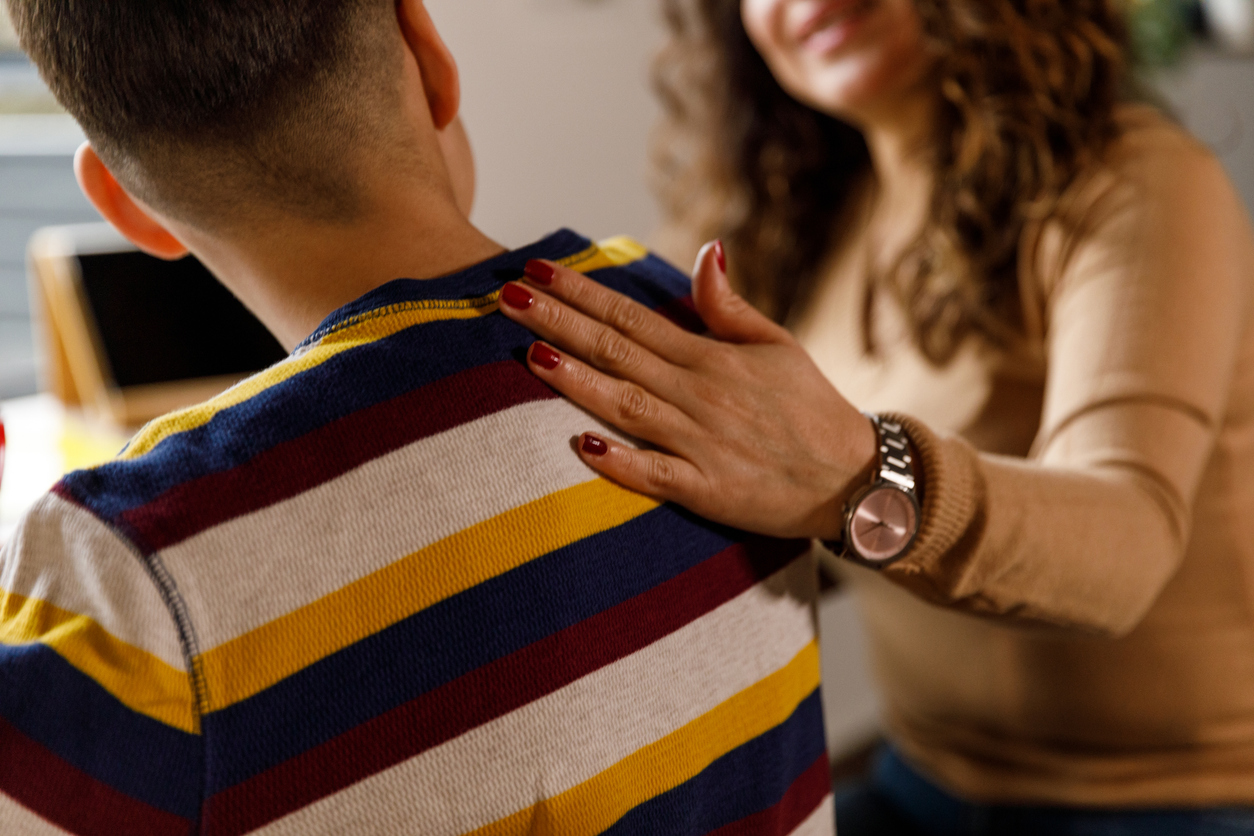Recognizing the signs of depression in teen boys can help parents and educators discover and address a potentially debilitating mental health problem early on. Teen boys sometimes exhibit different symptoms of depression compared to girls or adults. Signs of depression in teen boys can include low temper, irritability, problems with memory and attention, a greater likelihood of an emotional outburst, and social isolation.
Teen boys may experience depression differently than girls, often exhibiting symptoms such as irritability, anger, social isolation, or reckless behavior.
It’s essential to understand the signs of depression in teen boys so you’re prepared to provide support at home or through a teen depression treatment program. Regular mental health screenings can help teens struggling with mental disorders get the support they need to thrive in early adulthood and beyond.
This article explores depression in teen boys.
Signs of Depression in Teen Boys
While teen boys feel just as empty, hopeless, and joyless as their female counterparts, depression is often underdiagnosed and overlooked in young boys because they tend to express these emotions outward rather than inwardly.
Some teen boys process their sadness through anger or impulsivity and are often less likely to express their feelings verbally through open communication.
Some boys may exhibit classic symptoms like sadness or hopelessness; however, many (if not most) instances of male teen depression are often underlined by anger and volatility rather than outwardly pronounced feelings of isolation and loneliness.
Here are the most common signs of depression in teen boys:
1. Withdrawing From Friends, Family, and Activities
Social withdrawal and isolation are still common symptoms among teen boys experiencing depression.
It’s important to note that teen depression can manifest in symptoms that aren’t always aligned with textbook definitions of depression. Scientists and researchers acknowledge that men and boys often suffer in silence.
Despite this, many young boys still exhibit typical symptoms of depression. These include withdrawal from social activities and a loss of interest in previously enjoyable hobbies.
Related: How to Help a Teen with Depression
2. Significant Changes in Eating and Sleeping Habits
Tracking a teen’s mental health can be difficult for parents. When should you differentiate between a severe mental health issue and normal teen behavior? The answer is to look for severe anomalies.
Diet and sleeping habits are two forms of behavior that can say much about a teen’s mental and physical well-being. If your teen’s sleeping habits and diet have dramatically worsened as of late, then they may be experiencing depression.
3. Persistent Sadness, Tearfulness, or Emotional Numbness
While teen boys are a lot more likely to hide feelings of sadness or associate sadness with weakness and thereby express their frustration and hopelessness through high impulsivity, risk-taking, and anger, they may still experience moments of tearfulness or long-term emotional numbness and total isolation.
Related: The Dos and Don’ts of Helping Teens with Depression
4. Noticeable Loss of Interest in Hobbies, Passions
One of the critical characteristics of a depressive disorder is anhedonia, or the loss of joy.
Things that used to be fun might elicit fewer feelings of joy or aren’t uplifting. Depression doesn’t just alter a person’s baseline but can also change their relationship with their hobbies, passions, and interests.
Watch for a loss of interest in old hobbies and difficulty finding new things to do instead.
Related: How to Motivate a Depressed Teenager
5. Decline in Academic Performance, Lack of Focus
There is a neurological aspect to depression and other mental disorders that tax the brain and affect cognitive abilities.
People who struggle with depression and anxiety are less likely to remember things they have learned and more likely to struggle with retaining new information. In addition, they have a more challenging time focusing on the task at hand, and a more challenging time with executive functioning (the ability to plan, prioritize goals, and adapt to daily life).
6. Frequent Irritability, Unexpected Anger, or Agitation
Boys are less likely to internalize their sadness and more likely to take it out on the world around them. While behavioral issues, irritability, poor emotional regulation, and anger aren’t definitive signs of depression, many boys who exhibit these behaviors are likely depressed.
7. Expressions of Hopelessness, Worthlessness, or Guilt
Irritability as a marker for male teen depression can help parents better identify signs of depression in their teen boys. Still, it’s important to keep a lookout for traditional symptoms of depression as well. Exhibiting feelings or remarks of hopelessness, worthlessness, and guilt is common among teens with depression.
8. Fatigue, Lack of Energy, and Motivation
Two of the most obvious physical symptoms of depression are fatigue and pain.
Keep an eye out for complaints about aches and pains with no physical origin or clear cause, constant fatigue despite getting enough sleep, and severe lack of motivation (including an inability to get out of bed on some days or extreme procrastination of basic tasks, including hygiene).
9. Sudden Drop in Self-Esteem, Confidence Issues
In teen boys, a sudden drop in self-esteem and emerging confidence issues can be significant indicators of depression.
This may manifest as increased self-criticism, a noticeable decline in confidence during social interactions, and a pervasive sense of worthlessness or inadequacy.
Parents might observe their sons showing less interest in activities they once enjoyed or withdrawing from social engagements they previously approached with enthusiasm. These changes can often be misunderstood simply as typical teenage behavior or moodiness. However, when these signs persist, they point toward a more profound, underlying issue.
Recognizing this drastic change is crucial as it provides an opportunity for early intervention and support, which can be vital in managing depression effectively.
10. Thoughts of Death, Suicide, or Self-Harm
While girls are much more likely to report suicidal feelings and feelings of low self-worth, most suicides are male. Among teens, boys are about three times as likely to die by suicide than girls in the same age group.
Because boys are less likely to talk about these feelings or reveal them to others, many of these suicides come as a surprise to friends and family. It’s important to continuously keep in touch with your teen’s thoughts and feelings and ensure that they don’t conflate sadness or emotional vulnerability with weakness, or mistake hiding one’s pain as masculine.
Teen Depression Treatment
Teen depression is more than just moodiness; it’s a severe mental health condition that can affect every aspect of a young person’s life.
At Visions Treatment Centers, we offer a nurturing approach to teen depression treatment, featuring personalized therapy sessions, family involvement, and a supportive community that fosters resilience and healing.
Envision a place where your teen feels understood and supported, where they can regain their strength and happiness.
Contact Visions Treatment Centers in Southern California to learn how our specialized programs can help your teen overcome depression and thrive.
Conclusion
While some boys may exhibit classic symptoms like sadness or hopelessness, many express their distress through irritability, anger, or other behavioral issues. Understanding these male-specific signs can help parents and educators address the debilitating issue of depression in teen boys.








